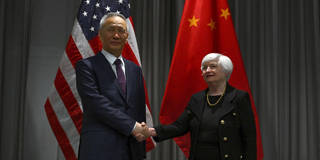 Sebastien Bozon/AFP via Getty Images
Sebastien Bozon/AFP via Getty Images
分裂的世界人人皆输
香港 - 在今年的达沃斯世界经济论坛年会上,联合国秘书长安东尼奥·古特雷斯(Antonio Guterres)对当前国际秩序的困境做出了不同寻常的坦率评估。他说,世界“在许多方面都遭受了一个完美风暴的困扰”,“我们需要合作,但我们却面临分裂。”
https://prosyn.org/oa863Efzh
To continue reading, register now. It’s free!
Register Now
Already have an account?
Log in



香港 - 在今年的达沃斯世界经济论坛年会上,联合国秘书长安东尼奥·古特雷斯(Antonio Guterres)对当前国际秩序的困境做出了不同寻常的坦率评估。他说,世界“在许多方面都遭受了一个完美风暴的困扰”,“我们需要合作,但我们却面临分裂。”